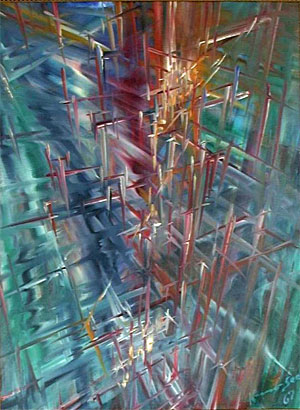Calculating Space (German: Rechnender Raum) is Konrad Zuse's 1969 book on automata theory. He proposed that all processes in the universe are computational. This view is known today as the simulation hypothesis, digital philosophy, digital physics or pancomputationalism. Zuse proposed that the universe is being computed by some sort of cellular automaton or other discrete computing machinery, challenging the long-held view that some physical laws are continuous by nature. He focused on cellular automata as a possible substrate of the computation, and pointed out that the classical notions of entropy and its growth do not make sense in deterministically computed universes. Zuse's thesis was later expanded by German computer scientist Jürgen Schmidhuber in his technical report Algorithmic Th
| Attributes | Values |
|---|
| rdf:type
| |
| rdfs:label
| - Calculating Space (en)
- Calculating Space (fr)
|
| rdfs:comment
| - Calculating Space (German: Rechnender Raum) is Konrad Zuse's 1969 book on automata theory. He proposed that all processes in the universe are computational. This view is known today as the simulation hypothesis, digital philosophy, digital physics or pancomputationalism. Zuse proposed that the universe is being computed by some sort of cellular automaton or other discrete computing machinery, challenging the long-held view that some physical laws are continuous by nature. He focused on cellular automata as a possible substrate of the computation, and pointed out that the classical notions of entropy and its growth do not make sense in deterministically computed universes. Zuse's thesis was later expanded by German computer scientist Jürgen Schmidhuber in his technical report Algorithmic Th (en)
- Calculating Space est le titre de la traduction anglaise du livre Rechnender Raum (littéralement: l'espace informatique) de Konrad Zuse (1969), le premier livre sur la physique numérique. Zuse proposa l'idée que l'univers est calculé par une sorte d'automate cellulaire ou d'autres machines informatiques discrètes, contestant l'opinion de longue date selon laquelle certaines lois physiques sont continues par nature. Il s'est concentré sur les automates cellulaires comme substrat possible du calcul, et a souligné (entre autres choses) que les notions classiques de l'entropie et de sa croissance n'ont pas de sens dans les univers calculés de façon déterministe. (fr)
|
| foaf:depiction
| |
| dcterms:subject
| |
| Wikipage page ID
| |
| Wikipage revision ID
| |
| Link from a Wikipage to another Wikipage
| |
| Link from a Wikipage to an external page
| |
| sameAs
| |
| dbp:wikiPageUsesTemplate
| |
| thumbnail
| |
| cs1-dates
| |
| date
| |
| has abstract
| - Calculating Space (German: Rechnender Raum) is Konrad Zuse's 1969 book on automata theory. He proposed that all processes in the universe are computational. This view is known today as the simulation hypothesis, digital philosophy, digital physics or pancomputationalism. Zuse proposed that the universe is being computed by some sort of cellular automaton or other discrete computing machinery, challenging the long-held view that some physical laws are continuous by nature. He focused on cellular automata as a possible substrate of the computation, and pointed out that the classical notions of entropy and its growth do not make sense in deterministically computed universes. Zuse's thesis was later expanded by German computer scientist Jürgen Schmidhuber in his technical report Algorithmic Theories of Everything. (en)
- Calculating Space est le titre de la traduction anglaise du livre Rechnender Raum (littéralement: l'espace informatique) de Konrad Zuse (1969), le premier livre sur la physique numérique. Zuse proposa l'idée que l'univers est calculé par une sorte d'automate cellulaire ou d'autres machines informatiques discrètes, contestant l'opinion de longue date selon laquelle certaines lois physiques sont continues par nature. Il s'est concentré sur les automates cellulaires comme substrat possible du calcul, et a souligné (entre autres choses) que les notions classiques de l'entropie et de sa croissance n'ont pas de sens dans les univers calculés de façon déterministe. On pense parfois que le théorème de Bell contredit l'hypothèse de Zuse, mais il n'est pas applicable aux , comme l'a fait remarquer Bell lui-même. De même, alors que le principe d'incertitude de Heisenberg limite de façon fondamentale ce qu'un observateur peut observer, lorsque l'observateur est lui-même une partie de l'univers qu'il essaie d'observer, ce principe n'exclut pas l'hypothèse de Zuse, qui considère tout observateur comme une partie du processus déterministe hypothétique. Jusqu'à présent, il n'y a pas de preuve physique univoque contre la possibilité que "tout n'est qu'un calcul". Plusieurs articles ont été écrits sur le sujet depuis la parution de l'ouvrage de Zuse sur la physique numérique. (fr)
|
| gold:hypernym
| |
| prov:wasDerivedFrom
| |
| page length (characters) of wiki page
| |
| foaf:isPrimaryTopicOf
| |
| is Link from a Wikipage to another Wikipage
of | |
| is Wikipage redirect
of | |
| is foaf:primaryTopic
of | |



![[RDF Data]](/fct/images/sw-rdf-blue.png)


![[cxml]](/fct/images/cxml_doc.png)
![[csv]](/fct/images/csv_doc.png)
![[text]](/fct/images/ntriples_doc.png)
![[turtle]](/fct/images/n3turtle_doc.png)
![[ld+json]](/fct/images/jsonld_doc.png)
![[rdf+json]](/fct/images/json_doc.png)
![[rdf+xml]](/fct/images/xml_doc.png)
![[atom+xml]](/fct/images/atom_doc.png)
![[html]](/fct/images/html_doc.png)